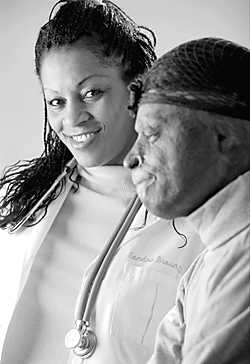Dr. Sandra Brown
Skin researcher and physician
Healing patients gives her more joy than money can buy
ucked into a second-floor corner of a plain professional building in Southfield, the small office does not look like a place where miracles occur. But Dr. Sandra Brown's patients passionately believe her to be the most compassionate, innovative physician they have ever visited.
"She is a great woman," says Detroiter Delbert McCoy, 48 (in photo at right). McCoy was severely burned in a firebombing 30 years ago, and Brown volunteered to treat him for free after reading a Detroit News report about him last year.
After only two treatments, McCoy was able to close his eyes for the first time since the incident. His scarring has diminished by 80 percent.
"She's just amazing," McCoy says. After so many years of seeing doctors who were unable to help him, "seeing someone who can actually do something to help me is truly amazing."
Brown, a medical doctor who holds undergraduate degrees in biology and chemistry, specializes in the treatment of severe acne, burns, scars and especially keloids, a type of scarring that is particularly prevalent in black skin.
In medical school at Wayne State University, she saw patients with keloids that were irritated by treatment and grew back larger - sometimes hanging off the body by six inches or more. Patients are often so embarrassed by their keloids they refuse to leave their homes.
Unwilling to accept that current medicine could not heal keloids, she used her background in chemistry and biology to devise her technique of applying acid compounds to the skin. Her treatment has successfully decreased or dissolved keloids from thousands of patients, and keloid therapy is now a major part of her practice.
"I get emotional with them. I cry with them," says Brown, 47, who says that neither white nor black doctors know enough about treating keloids. After traditional laser or surgical treatment, patients often are left worse off than before.
"These people are tired of being stared at and being offered hope, then being told hope is a myth," Brown says.
Brown feels so strongly about her work that she treats patients regardless of their ability to pay, often working on her day off. She recently turned down a chance to build her dream house because she would have had to start charging all patients for her services in order to pay for it.
"People commit suicide because of this, and I hold in my hand the power to heal them," she says. "And I am supposed to sit home with my family when there are people out there who cannot bathe? Who do not leave their homes because they are horrified at how they look? I cannot handle that."
So she does not refuse a patient who cannot pay, because "you don't know what you're unfolding."
Regarding her commitment, Brown says she is doing only what she is meant to do.
"I have been blessed with a gift," she says softly. "I am able to bring hope. You couldn't pay me enough money to give me the feeling I have when I see a person bloom in front of me."
- Tracy L. Pipp / The Detroit News
